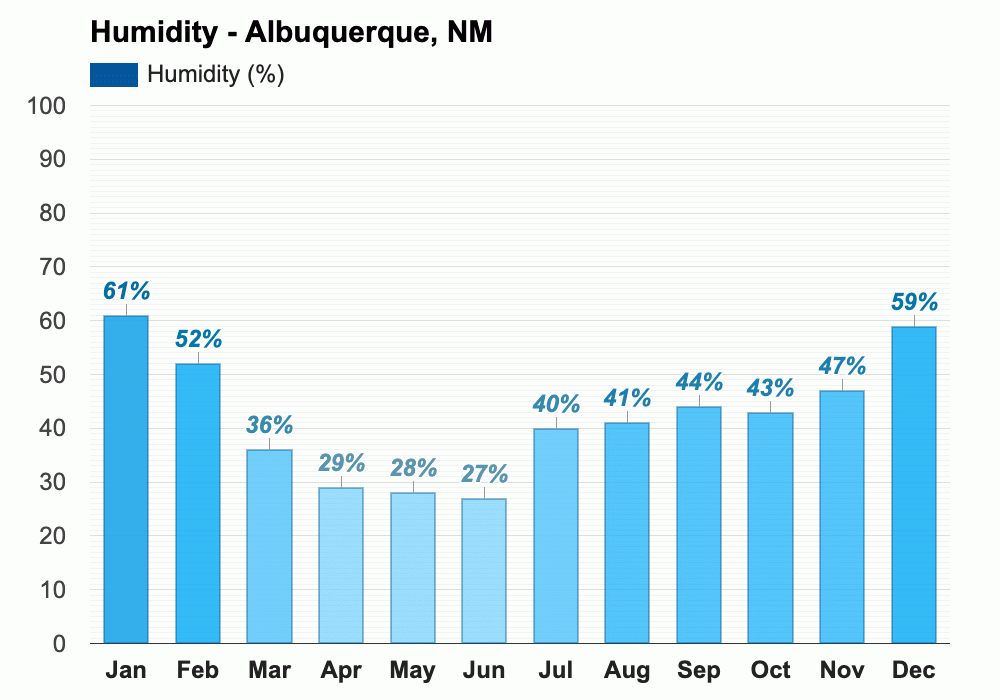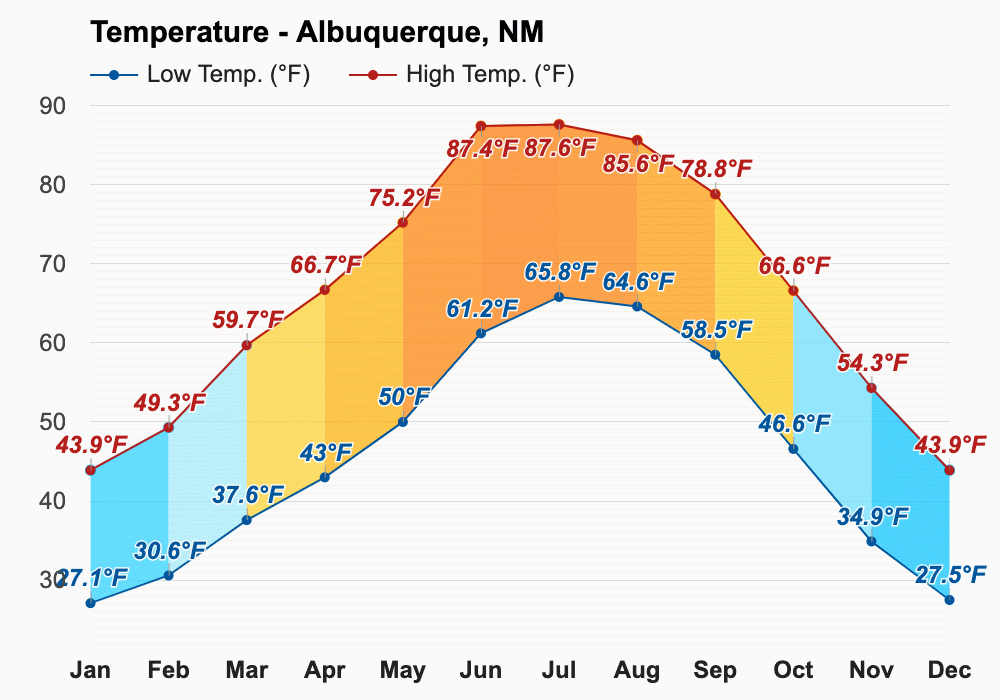Albuquerque New Mexico Average Weather: A Comprehensive Guide
When planning a trip to Albuquerque, New Mexico, understanding the average weather is essential for ensuring a comfortable and enjoyable experience. Albuquerque's climate offers distinct seasonal variations, making it a fascinating destination year-round. Whether you're a first-time visitor or a local resident, this article will provide you with an in-depth look at Albuquerque's weather patterns.
Albuquerque, located in the heart of New Mexico, boasts a semi-arid climate that is influenced by its elevation and geographical position. The city experiences warm summers, mild winters, and relatively low humidity levels, making it an appealing destination for outdoor enthusiasts and tourists alike.
This guide will explore the average weather conditions in Albuquerque, including temperature trends, precipitation patterns, and seasonal highlights. By the end of this article, you'll have a clear understanding of what to expect throughout the year, helping you plan your visit effectively.
Read also:February Pisces Vs March Pisces Understanding The Differences And Similarities
Table of Contents
- Climate Overview in Albuquerque
- Seasonal Temperatures
- Precipitation Patterns
- Best Time to Visit Albuquerque
- Weather in Albuquerque: Month-by-Month
- Extreme Weather Conditions in Albuquerque
- Activities by Season in Albuquerque
- Historical Weather Data
- Impact of Climate Change on Albuquerque Weather
- Conclusion and Final Tips
Climate Overview in Albuquerque
Albuquerque's climate is classified as semi-arid, with distinct seasonal variations. The city's elevation of approximately 5,312 feet (1,619 meters) contributes to its unique weather patterns. Summers are warm and dry, while winters are relatively mild, with occasional snowfall. Spring and fall bring moderate temperatures and vibrant landscapes.
Factors Influencing Albuquerque's Weather
Several factors influence Albuquerque's weather, including:
- Elevation: Albuquerque's high elevation results in cooler temperatures compared to lower-altitude areas.
- Geography: The city is situated near the Rio Grande River and surrounded by mountains, which affect wind patterns and precipitation.
- Climate Zones: Albuquerque lies in a transitional zone between the desert and mountain climates, leading to diverse weather conditions.
Understanding these factors is crucial for predicting and preparing for Albuquerque's weather.
Seasonal Temperatures
Albuquerque experiences four distinct seasons, each with its own temperature profile. Below is a breakdown of the average temperatures for each season:
Summer Temperatures
Summers in Albuquerque are warm, with average high temperatures ranging from 85°F to 95°F (29°C to 35°C). Nights are cooler, with lows typically dropping to around 60°F (15°C). The dry air and low humidity make the heat more tolerable compared to humid climates.
Winter Temperatures
Winters in Albuquerque are mild, with average high temperatures ranging from 45°F to 55°F (7°C to 13°C). Nights can be chilly, with lows dropping to around 25°F (-4°C). Snowfall is minimal but can occur occasionally during the winter months.
Read also:Does Wynaut Evolve Everything You Need To Know About This Unique Pokeacutemon
Spring and Fall Temperatures
Spring and fall bring pleasant temperatures, making them ideal times to visit Albuquerque. Average highs range from 60°F to 75°F (15°C to 24°C), while lows hover around 35°F to 50°F (2°C to 10°C).
Precipitation Patterns
Albuquerque receives an average of 9 inches (23 cm) of precipitation annually, with most of it occurring during the summer monsoon season. The city experiences occasional thunderstorms, especially during July and August.
Monsoon Season
The monsoon season typically begins in early July and lasts until late August. During this period, Albuquerque experiences increased humidity and frequent afternoon thunderstorms. These storms provide much-needed moisture to the region but can also cause flash flooding in certain areas.
Winter Precipitation
Winter precipitation in Albuquerque is minimal, with occasional snowfall. The Sandia Mountains, located east of the city, receive more snow than the urban areas, making them a popular destination for winter sports enthusiasts.
Best Time to Visit Albuquerque
The best time to visit Albuquerque depends on your preferences and the activities you wish to enjoy. For mild weather and fewer crowds, spring (March to May) and fall (September to November) are ideal. During these seasons, you can explore the city's outdoor attractions without the extreme heat of summer or the chill of winter.
Events and Festivals
Albuquerque hosts several events and festivals throughout the year, including:
- Albuquerque International Balloon Fiesta (October): A world-famous event featuring hundreds of hot air balloons.
- Anderson-Abruzzo Albuquerque International Balloon Museum: A must-visit for balloon enthusiasts.
- Fiery Foods & BBQ Festival (March): Celebrating spicy cuisine and barbecue.
Attending these events can enhance your Albuquerque experience while enjoying the city's favorable weather conditions.
Weather in Albuquerque: Month-by-Month
Here's a month-by-month breakdown of Albuquerque's average weather:
January
January is the coldest month in Albuquerque, with average highs of 46°F (8°C) and lows of 24°F (-4°C). Snowfall is minimal, but frost can occur on clear nights.
April
April brings mild temperatures, with average highs of 70°F (21°C) and lows of 40°F (4°C). Spring blooms begin to appear, making it a picturesque time to visit.
July
July marks the start of the monsoon season, with average highs of 90°F (32°C) and lows of 62°F (17°C). Afternoon thunderstorms are common, providing relief from the heat.
October
October is one of the best months to visit Albuquerque, with average highs of 70°F (21°C) and lows of 40°F (4°C). The Albuquerque International Balloon Fiesta takes place this month, attracting visitors from around the world.
Extreme Weather Conditions in Albuquerque
While Albuquerque's weather is generally mild, the city can experience extreme conditions on occasion. These include:
Dust Storms
Dust storms can occur during dry periods, particularly in spring and summer. These events can reduce visibility and impact air quality, so it's essential to stay informed about weather warnings.
Flooding
Heavy rainfall during the monsoon season can lead to flash flooding in certain areas. It's crucial to follow local news and emergency alerts during this time.
Cold Snaps
Although rare, Albuquerque can experience cold snaps during winter, with temperatures dropping below freezing. Proper preparation is necessary for such events.
Activities by Season in Albuquerque
Albuquerque offers a wide range of activities throughout the year, catering to various interests and preferences. Below are some suggestions for each season:
Summer Activities
- Hiking in the Sandia Mountains
- Biking along the Rio Grande Trail
- Exploring the Albuquerque BioPark
Winter Activities
- Skiing and snowboarding in the Sandia Mountains
- Visiting the Albuquerque Zoo
- Enjoying indoor attractions like museums and galleries
Spring and Fall Activities
- Attending local festivals and events
- Gardening and exploring botanical gardens
- Taking scenic drives through the surrounding landscapes
Historical Weather Data
Historical weather data provides valuable insights into Albuquerque's climate trends. According to the National Oceanic and Atmospheric Administration (NOAA), Albuquerque's average annual temperature has increased slightly over the past few decades, consistent with global warming patterns.
Data from the Albuquerque International Sunport shows that the city's precipitation levels have remained relatively stable, with occasional fluctuations due to natural climate variability.
Impact of Climate Change on Albuquerque Weather
Climate change is expected to influence Albuquerque's weather in the coming years. Rising temperatures could lead to longer and hotter summers, while precipitation patterns may become more erratic. These changes could impact local ecosystems, water resources, and agricultural practices.
Efforts to mitigate climate change effects are underway, including initiatives to promote renewable energy and water conservation in the region.
Conclusion and Final Tips
Albuquerque, New Mexico, offers a diverse and fascinating climate that appeals to visitors year-round. By understanding the average weather conditions, you can plan your trip effectively and make the most of your time in this vibrant city.
Remember to:
- Check the weather forecast before your visit.
- Pack appropriate clothing for the season.
- Stay informed about potential extreme weather conditions.
We invite you to share your thoughts and experiences in the comments section below. Additionally, feel free to explore our other articles for more insights into Albuquerque and its surroundings. Thank you for reading, and happy travels!
References:
- National Oceanic and Atmospheric Administration (NOAA)
- Albuquerque International Sunport
- City of Albuquerque Official Website


